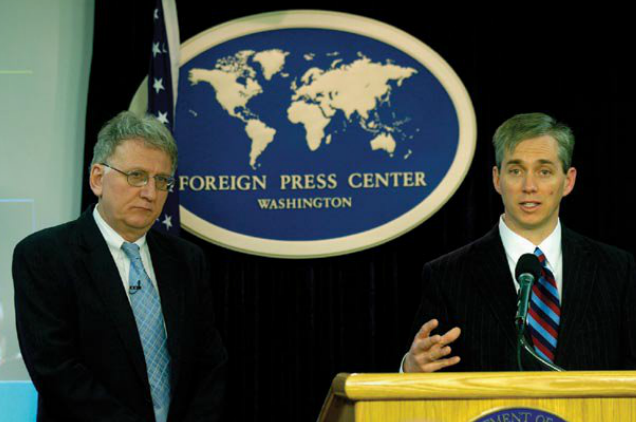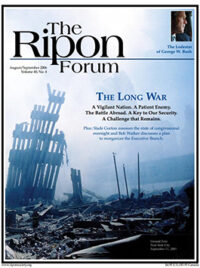Clay Sell was sworn in as Deputy Secretary of Energy on March 21, 2005. In this role, he serves as the Department’s Chief Operating Officer, assisting the Secretary with policy and programmatic oversight over the 100,000 employee, $23 billion agency. He plays a vital role in maintaining and strengthening the economic and national security of the Nation, and is a driving force behind the Global Nuclear Energy Partnership, which he discusses with The Ripon Forum below:
∗∗∗∗∗∗∗∗∗∗∗∗∗∗∗∗∗∗∗∗
RF: What is the goal of the Global Nuclear Energy Partnership?
Sell: The primary goals of GNEP are: 1) To increase access to clean, non-emitting nuclear energy throughout the world; 2) Increase the amount of energy generated by nuclear fuel while decreasing the amount of material that must be disposed in a waste repository; and 3) Reduce the risk of proliferation by providing fuel cycle services to developing countries so they do not need to develop uranium enrichment or spent fuel reprocessing capabilities.
RF: What is the reaction among other countries to this initiative?
Sell: International interest in GNEP has been very strong. DOE has briefed energy officials in foreign capitals, government representatives at the IAEA in Vienna, and visiting foreign dignitaries. Many Embassy Science Counselors in Washington have received briefings at DOE Headquarters.
We can’t speak for individual countries, but in general, many countries have expressed strong interest in participating in the GNEP vision. For example, Russian President Putin was quoted in the media recently as speaking favorably about GNEP and his country’s potential involvement.

U.S. Dept. of Energy Deputy Secretary Clay Sell (right) discusses the Global Nuclear Energy Partnership at the Foreign Press Center in Washington DC, with Robert Joseph, U.S. Under Secretary of State for Arms Control and International Security.
It’s important to note that GNEP, right now, is a vision and a work in progress. It’s also important to note that the “P” in GNEP stands for partnership. We intend to continue to have discussions with other countries over the best way to attain the GNEP vision, which is making nuclear power available to every country without developing countries having to construct fuel cycle facilities for enrichment or reprocessing. We are also making progress with some of our international partners on defining joint work needed to demonstrate advanced recycling technologies.
RF: What about the reaction on Capitol Hill?
Sell: The reaction has generally been quite positive, depending upon the individual member. As the Energy Department provides more detail about the GNEP vision and how it hopes to go about obtaining that vision, I believe there will be even greater acceptance of GNEP. We are hopeful that Congress will fund the GNEP program at the Administration’s full request of $250 million for FY07, a tangible endorsement of the GNEP vision.
WE INTEND TO CONTINUE TO HAVE DISCUSSIONS WITH OTHER COUNTRIES OVER THE BEST WAY TO ATTAIN THE GNEP VISION, WHICH IS MAKING NUCLEAR POWER AVAILABLE TO EVERY COUNTRY WITHOUT DEVELOPING COUNTRIES HAVING TO CONSTRUCT FUEL CYCLE FACILITIES FOR ENRICHMENT OR REPROCESSING.
RF: The House voted this past May to cut the Administration’s funding request for GNEP. Does this reflect a lack of support for the program itself, or a concern over how it falls in with other budget priorities? Do you think these cuts will be restored in conference?
Sell: Probably a little of both, but as we make progress detailing and explaining the GNEP vision, I believe many House members are becoming more comfortable with the program. I’m hopeful when the Conference Committee completes its work this fall, DOE will receive full funding for its FY ‘07 request for GNEP.
RF: Do you think the American people are ready for a new emphasis and expansion of nuclear power?
The U.S. currently gets 20 percent of our electricity from nuclear energy in the United States and we look forward to getting more nuclear power plants up and running soon.
Sell: Yes. Polling from a number of sources has told us over recent years that the majority of Americans support nuclear power as a part of this country’s energy portfolio. I am excited about the prospects for nuclear power in the U.S. and abroad. Nuclear power proves to be a safe, clean and emissions-free alternative to fossil fuels, which is why President Bush and we at the Energy Department are doing everything we can to support and encourage the expansion of such a promising source of power. The U.S. currently gets 20 percent of our electricity from nuclear energy in the United States and we look forward to getting more nuclear power plants up and running soon. And hopefully, as a result of the Energy Policy Act of 2005, which makes available federal risk insurance for the first six new nuclear power plants, industry will have enough incentive and support to move forward – which could eventually have enormous consequences for the American energy sector, for our economy, for our national security and for generations to come.
RF: Practically speaking, if all goes as the Administration hopes, when would the United States start seeing the benefits of this Partnership?
Sell: I believe we are already seeing some benefits, in that countries all over the world are talking about the GNEP vision of providing fuel cycle services that will give developing nations access to nuclear power without having to build enrichment or reprocessing facilities. Hopefully, this discussion will lead to commitments that developing countries can rely on. In this country, DOE is moving forward with looking at potential sites and technologies for two important GNEP facilities:
• An Advanced Burner Reactor, which is a fast reactor that will use transmutation fuel and consume transuranic elements within the fuel and generate electricity.
• A Consolidated Fuel Treatment Center, where usable uranium and transuranics would be extracted from spent light-water reactor fuel for use in fabricating fast reactor fuel.
DOE anticipates beginning an environmental impact study of technologies and sites sometime this year. A final decision on whether to proceed with facilities would be made in 2008, followed by construction.

Deputy Secretary Sell (center) revives an explanation of GNEP-related nuclear energy technologies during a visit in June 2006 to the Oak Ridge National Lab’s Radiochemical Engineering Development Center.




